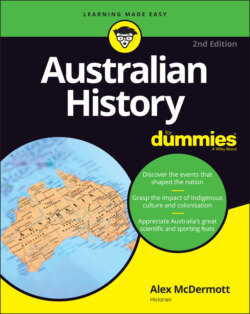Читать книгу Australian History For Dummies - Alex McDermott - Страница 91
Bligh gets down to business
ОглавлениеIn came Bligh. He knew he’d been chosen by Sir Joseph Banks as the man to bring an unruly and disobedient colony back into line, and that if some serious kicking of heads was in order, those back in the Colonial Office would be fine with that.
Bligh arrived in the colony in 1806 with a very set idea of the sort of place NSW should be. The original vague idea of convicts becoming a self-sufficient rural peasantry had stuck fast in his mind. The problem, however, was that it had never been like that, and it was never going to be like that. By trying to force NSW to revert to a kind of pre-modern self-subsistence economy and society, rather than assist it in its continued adjustment to the mercantile and commercial realities it was part of in the early 19th century, Bligh was trying to force back the tide. The place was not, and never had been, what these original government orders had told it to be. The place, as one historian put it, was ‘born modern’.
Bligh was not the sort of individual to be disconcerted when reality didn’t conform to what he insisted it ought to be. To his grim satisfaction, he found no shortage of felons and ex-felons on the make, with men and women (both free and unfree) involved in ‘dubious’ enterprises such as trading and buying and selling. So Bligh got to work.
One of main problems Bligh focused on was the favourite form of incentive payment and extra wage: Rum. He attacked the distillation and rum retailing industry, which the officers had already left and was by this time dominated by soldiers and ex-convicts. The inhabitants of Sydney, who at this point made up more than half of NSW’s total population, were livid; the main populace, made up of convicts, ex-convicts and soldiers, particularly so.
Not content, Bligh then went further. He declared that some who had leases and property rights in the township would have to be evicted to fit in with his new town plans. At the same time, Bligh made it clear that he despised the NSW Corps soldiers, claiming they were no better than the convicts and, because many of them were ex-convicts themselves, couldn’t be trusted. Then he finished it nicely by calling them ‘wretches’, ‘tremendous buggers’ and ‘villains’.
